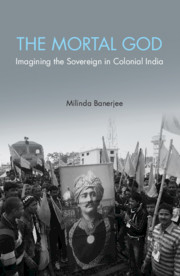Book contents
- Frontmatter
- Dedication
- Contents
- Acknowledgements
- Note on Transliteration
- Abbreviations
- Note on Documents Used
- Introduction
- 1 ‘Caesar of India’: Debating the British Monarchy and Colonial Rulership
- 2 ‘State is the Household Vastly Enlarged’: Imagining Sovereignty through the Princely States
- 3 ‘One Law, One Nation, One Throne’: Debating National Unity
- 4 ‘One has to Rule Oneself’: Collectivising Sovereignty in Peasant Politics
- 5 ‘God's Kingdom Has Come’: Messianic Sovereignty in Late Colonial India
- Conclusions and Further Thoughts
- Index
1 - ‘Caesar of India’: Debating the British Monarchy and Colonial Rulership
Published online by Cambridge University Press: 13 September 2018
- Frontmatter
- Dedication
- Contents
- Acknowledgements
- Note on Transliteration
- Abbreviations
- Note on Documents Used
- Introduction
- 1 ‘Caesar of India’: Debating the British Monarchy and Colonial Rulership
- 2 ‘State is the Household Vastly Enlarged’: Imagining Sovereignty through the Princely States
- 3 ‘One Law, One Nation, One Throne’: Debating National Unity
- 4 ‘One has to Rule Oneself’: Collectivising Sovereignty in Peasant Politics
- 5 ‘God's Kingdom Has Come’: Messianic Sovereignty in Late Colonial India
- Conclusions and Further Thoughts
- Index
Summary
Introduction
This chapter focuses on the ways in which British colonial administrators, politicians and intellectuals used concepts and rituals of singular rulership, and especially those associated with the British monarchy, to justify the construction of a modern order of state sovereignty in India. It also highlights British voices which were sceptical towards authoritarian articulations of colonial rule, and, in a more elaborate manner, underlines Indian appropriation and subversion of British monarchic rhetoric and ceremonial. The aim is to demonstrate the variety of strategies through which colonial rulership was vociferously debated by British as well as Indian actors, with a constitutive impact on the emergence of transnationally-spanned spaces of political thinking.
British imperial ideologies, as they emerged in South Asia following the formal assumption of the government of India by the Crown in 1858, were part of broader flows of ideas and information about monarchic rule. Colonial administrators and thinkers cited models of rulership within the wider British Empire, as well as in the Habsburg Empire, France during the Second Empire, Imperial Germany, Savoyard Italy, Romanov Russia, the Ottoman Empire and Afghanistan, to articulate their own visions of sovereignty. The Indian experience of colonial rulership resulted in parliamentary debates and influenced British intellectuals and litterateurs as they re-imagined ideas of governance amidst social tensions in an industrialising world. New and globally-oriented visions of improvement, civilization, modernity and progress were often advocated by the British through the language of singular rulership. Monistic command-oriented authority, symbolised through the British monarchy, was championed by some colonial administrators and politicians as a way of efficiently bringing modernity into India in line with global changes, ending the stagnation and fragmentation supposedly inherent in a backward society. Singular rulership stood here as the ceremonial face of a transcendental idea of progress rationally ordering a ‘primitive’ world.
Others however affirmed more conservative (rather than purely progress-oriented) articulations of monarchic rule. Colonial practices of property ownership and fiscal extraction, as well as regimes of law, were also often expressed through monarchic imaginaries. Certain colonial administrators saw kingship as an instrument to translate governance for Orientals who supposedly could not understand the ‘abstractions’ of state authority unless they saw it in a ‘personal’ form.
- Type
- Chapter
- Information
- The Mortal GodImagining the Sovereign in Colonial India, pp. 51 - 107Publisher: Cambridge University PressPrint publication year: 2017



